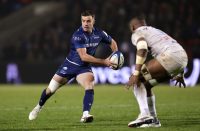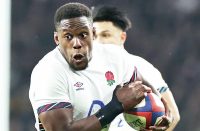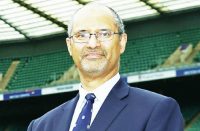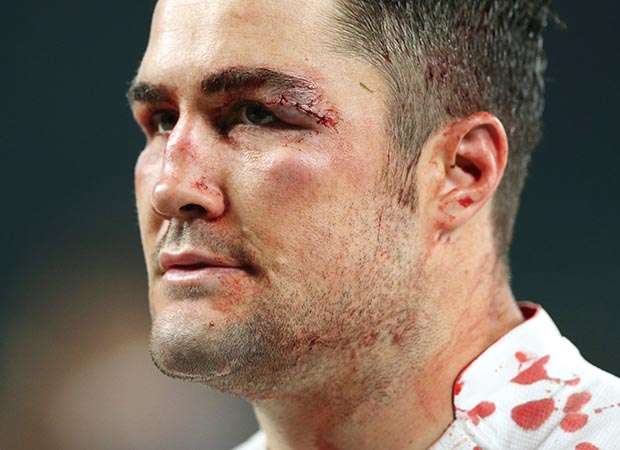 Brad Barritt has a reputation for being England‘s midfield rock. We are talking about a centre who is not just teak-tough mentally and body-on-the-line brave, but the undisputed leader of Stuart Lancaster’s defensive line. This explains why, whenever Barritt is fit for duty, there is an assumption he will be straight back in the starting line-up even though he is seen as a steady rather than sparkling attacker.
Brad Barritt has a reputation for being England‘s midfield rock. We are talking about a centre who is not just teak-tough mentally and body-on-the-line brave, but the undisputed leader of Stuart Lancaster’s defensive line. This explains why, whenever Barritt is fit for duty, there is an assumption he will be straight back in the starting line-up even though he is seen as a steady rather than sparkling attacker.
If the England head coach has a ‘go-to’ man it is the Saracens centre, even to the extent of employing him in the problem outside-centre slot last autumn ahead of Jonathan Joseph, right, despite inside-centre being the position for which his crash-tackling and hard, straight running are the perfect fit.
Barritt’s battling attributes were showcased in his last international appearance, as a driving force in England’s 26-17 home win over Australia nine months ago. When he eventually hobbled off just after an hour his bloody mask of a face was testament to his fearless tackling and unflinching commitment, and it is those qualities, along with his almost manic will to win, that make him a certainty to start against Ireland at Twickenham on Saturday in England’s final World Cup curtain-raiser.
Despite Lancaster being deprived of Barritt’s services for the entire 2015 Six Nations due to knee ligament damage, after announcing the Saracens man in his World Cup 31 he explained why he rates him so highly.
“His ultimate strength is his competitiveness – his winner’s mentality. I’ve never met anyone more competitive. That drives him. He’s a very good defender, and he inspires and gives confidence to those who defend around him. He’s very tough – a mentally strong player. He’s in our leadership group, and I trust his opinion. In all the big games we’ve won he’s played in all of them. He played in that Australia game and I remember one hit on Quade Cooper right at the end that exemplified the commitment he puts in. He knows that he’s in a competitive position, up against players with different attributes, and always seems to come out well.”
However, despite the South African-born centre’s defensive steel always attracting the most attention – to the extent that he is often seen as a one-trick pony – his attacking contribution is regularly overlooked. A reprise of that match indicates that viewing Barritt simply as a defensive bulwark sells him short. For instance, after taking the ball at inside-centre after a scrum it was his sharp diagonal burst, sucking-in two Wallaby tacklers before laying the ball back quickly, which paved the way for Ben Morgan’s first try.
Barritt’s stalwart presence has also taken some of the heat out of the speculation on how Lancaster will shuffle his World Cup midfield cards. All of a sudden Sam Burgess‘ positional inexperience following Bath‘s decision to switch him from centre to blindside, and Manu Tuilagi‘s ban after pleading guilty to an assault charge, seem less ominous.
Barritt is understandably circumspect in his comments about the axing of Luther Burrell and Billy Twelvetrees from the 31 in favour of Burgess and Henry Slade, but offers this opinion.
“My heart goes out to the likes of Luther and Billy, to go all the way up to selection-day and be cut is very tough. Across the centre roles there’s been a lot of stepping in and out. In fact, it’s been whittled down from eight to four, and that has involved some trial and error. We have all trained with each other, and all trained against each other. Now you have four different centres in the squad.”
Ask him about whether he sees Burgess as his main threat for the 12 shirt and, for once, he opts not to tackle head-on. “For every player in the squad there is going to be competition. I welcome competition, and it’s all about the team. I’m sure I speak for all the centres that we want to bring out the best in each other, help each other to improve. Like the other guys, however, I want to be the starting centre in my role.”
It’s a calm and collected response, and the same authority is evident in the way he handles the vexed question of never having started an international at 12 with Joseph alongside him at 13, despite both of them having been in the squad together intermittently since 2012.
“We have been in a match-day 23, in the squad together in South Africa (in 2012), and he came on at Twickenham when we played them. We’ve done a lot during the training weeks to simulate what Test match conditions are like, so in that sense we’ve played together.”
He adds: “But of course that can’t fully replicate the intensity of a Test match, so it’s essential we make full use of all the work we put in during training games. We have now had nine weeks preparation together. I believe that is ample time to forge a relationship, and across the board we have zero doubt that the combination can gel together.”
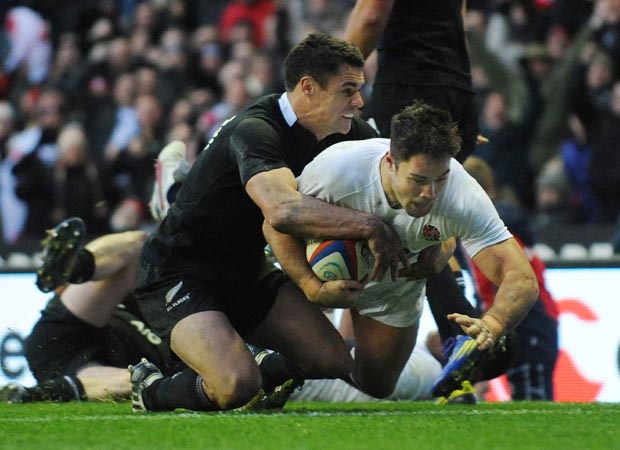 Barritt says that if he’d had to he could have played in last weekend’s return warm-up match against France in Paris, but withdrew due to sciatica, and he offers some insight into England’s dismal performance for the first hour of their 25-20 loss.
Barritt says that if he’d had to he could have played in last weekend’s return warm-up match against France in Paris, but withdrew due to sciatica, and he offers some insight into England’s dismal performance for the first hour of their 25-20 loss.
“With the two France games and the upcoming Ireland game, there was always an element of training to fatigue. But that’s now easing off daily. The whole schedule is designed to ensure we enter the tournament in absolute peak condition, and I believe we shall.”
He continues: “It has always been about the bigger picture, and we are fortunate to have the support staff that we do. The planning was to peak for the Fiji game on September 18, not a month before the start of the World Cup. The three pre-World Cup Tests, while games we want desperately to win, are a part of our overall preparation for the main event.”
However, Barritt is also frank about England’s failings and says that fatigue was only one element. “We’ve studied closely what happened in Paris. There’s probably an element of fatigue, but also we’ve focussed on our indiscipline. We’ve had a good hard look at the penalties we conceded, particularly those that cost us points. What we noted very quickly is that in a World Cup you simply cannot afford to give away such points, or be that indisciplined.”
Barritt’s next statement presents a snapshot of the leadership qualities Lancaster values so highly. “I do not accept that there is ever an excuse for players being flat for England. Every time you pull on an England jersey, you represent the whole country, and it is what you strive to do all your life.”
He says: “There were elements in that game that caused us to lose energy, such as losing possession. As a consequence you lose collisions, and that saps the energy out of you and gives energy to the French. In away games, when you start shipping points, it lifts the home crowd who, in turn, raise their team. That was what happened in Paris. The bottom line is that the learning curve from that game will prove vital going into the World Cup. We don’t want those errors in the tournament.”
Barritt says that he hopes he brings focus and discipline to the England cause. “I’d like to think that one of my strengths is on-field leadership and reading how a game ebbs and flows. Ultimately, it’s about being able to read what is happening and bringing things back your way. Last week was a learning curve in terms of what not to do at the breakdown. In a situation where you are not under any stress, sometimes there is no immediate need to go for the ball. Making those decisions in the heat of battle can be decisive.”
Barritt is looking forward to England setting the record straight when they play Ireland. “It’s a fantastic way of going into the World Cup. We always seek to adopt a front-foot mentality in tandem with a massive sense of pride in the jersey.”
He adds: “Anything less than a win on Saturday would be a massive disappointment. Just two weeks out from the World Cup, everyone will want to go out against Ireland with all guns blazing. Lots of people will want to make amends for Paris and put the jersey back up there.”
With Barritt back at 12 against the Irish, bank on the passion and commitment which disappeared on the other side of The Channel returning with a vengeance.


